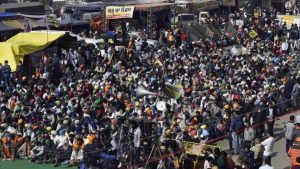The Union government and farm unions protesting a set of agricultural laws the latter claim will hurt their livelihood are likely to restart negotiations that ran aground last week, with both agriculture minister Narendra Singh Tomar and a major platform of farm unions on Monday signalling their willingness to resume talks.
Tomar told reporters in Delhi that the government was engaged in efforts to restart negotiations that broke down after five rounds last week. “When a date is fixed, we will let you know,” he said
Hours later, the All India Kisan Sangharsh Committee (AIKSCC) — a joint platform of the protesting farmers camped on the outskirts of Delhi — said it was ready for talks again but with certain conditions.
The farm groups, mostly from Punjab, which have been pressing for a complete repeal of the three laws, said they needed three principal assurances before returning to the negotiating table.
One, talks cannot be about old proposals which farm unions have rejected. Two, the government should draw up a new agenda. Three, discussions must be focused on a repeal of the farm laws.
The riders appear to put the onus on the government to draw up an agenda acceptable to the farmers. To be sure, the government has reiterated the farm laws will benefit farmers. On their part, the farmers have held firm on the demand for repealing the three laws, and on Monday observed a hunger strike across the country, blocking highways and hitting the streets in protest.
“The government [is] repeatedly dishing out old rejected logic. Farmers are ready for talks, but the three Farm Acts and the Electricity Amendment Bill 2020 have to be withdrawn,” said Avik Saha, the secretary of the AIKSCC. Kavitha Kuruganti, another leader of the AIKSCC, said farmers were not averse to talking again. “So, if the government sends the invite, the agenda laid out there will be the key to any future negotiations.”
Earlier in the day, Tomar met a delegation of farmers from five states who pledged their support for the laws, and said that a meeting will “definitely happen”.
“Our efforts to restart talks are on. Talks will happen. We are always open to discussions to solve farmers’ issues,” Tomar said.
“The government has been talking to farm leaders over phone informally. When things work out, a formal invite is likely to be sent again with a revised agenda,” a person familiar with development told HT, requesting anonymity.
A massive farmers’ protest was set off by three laws pushed by the government in September that allow agribusinesses to trade with minimal regulation, permit traders to stockpile large quantities of food commodities for economies of scale and lay down new contract farming rules. Farmers say the new rules favour big corporations to whom they will lose business and gradually end the system of state-set minimum prices. Protesters decided to call off further negotiations on December 8, after a meeting with home minister Amit Shah, claiming a stalemate.

The government on December 9 sent a written proposal to amend some provisions of the laws for greater oversight on deregulated markets, sparing farmers penalties for stubble burning, which causes pollution and promising to keep providing farmers subsidised power instead of direct cash transfer, but farm union say they won’t call off their agitation until the laws are fully repealed.
The willingness expressed by both sides to explore ways of meeting again comes amid hectic behind-the-scenes efforts to prepare a mutually agreeable agenda, the official quoted above said.
“Why are thousands of farmers sitting out in the cold? Only to talk to the government. The government has ruled out a repeal of the laws. But we can still talk to see light at the end of the tunnel,” Saha said.
“Withdrawal of three laws is necessary but not sufficient,” said Yogendra Yadav, a senior leader of the agitation, implying farmers also want legal guarantee of support prices.
Analysts say economic reforms in mass sectors, such as labour and agriculture, will always be challenging because unlike financial reforms, these sectors are about livelihoods.
“The government could suggest new institutions like a regulator for contract farming to gain confidence of farmers,” said Soumya Kanti Ghosh , group chief economic adviser of the State Bank of India, the country’s largest lender.
The developments came on a day farm groups across several states clashed with police and reiterated their opposition to the laws.
Meanwhile, farm organisations from five states representing the All India Kisan Coordination Committee met Tomar for over two hours.
This is the fourth group of farmers who have met the agriculture minister to show support to the reforms, which has come as shot in the arm of a government battling the massive agitation against its move to liberalise the farm sector.
Tomar told the farm organisations that “intention and policy of the government are clear and farmers are already benefiting from the pro-farmer reforms which will help in increasing the income of farmers”.